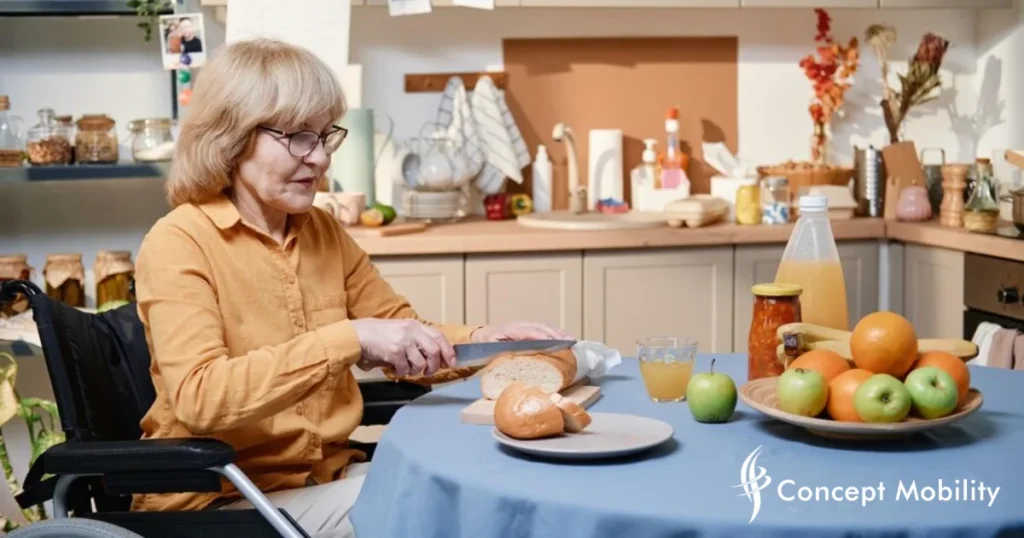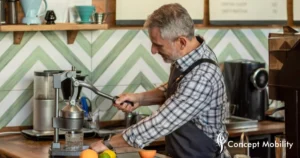
Kitchen Aids for Elderly and Disabled Individuals: Comprehensive Guide
Kitchen aids are essential for improving the independence and functionality of older and disabled people in the context of contemporary kitchen aids for elderly and accessibility. At Concept Mobility UK, our expert team provides outstanding services for people with restricted mobility or dexterity, the correct kitchen tools, from ergonomic tools to specialized appliances, making meal preparation safer and easier. In this guide, we examine the many kinds of kitchen appliances that are out there and offer advice on how to pick the ones that will work best for you.
Recognizing the Value of Kitchen Aids for Elderly and Disabled
Cooking and meal preparation are examples of ordinary jobs that might become difficult as people age or have impairments. Kitchen aids for the elderly are made to help with these problems by offering convenience, support, and help in the kitchens. With the correct kitchen assistance, aged and disabled people can continue to enjoy cooking and eating while maintaining their independence. This includes reaching high shelves, grasping tools, and running appliances.
Types of Kitchen Aids for Elderly and Disabled
Comfortable Cutlery and Equipment
Kitchen tools and utensils with ergonomic designs are a need for anyone with restricted movement or dexterity. These tools are easy to hold and use because of their lightweight design, non-slip grips, and ergonomic handles. Cutlery sets that are adaptive, knives with easy grips, and jar openers that can fit different hand sizes and grip strengths are a few examples.
Utilize Reach Extensions
Reach extenders are a very useful type of kitchen aids for individuals with limited mobility who have trouble getting to high shelves or deep cupboards. These gadgets let people hold and retrieve objects without straining or stretching thanks to their long handles with a grasping mechanism at the end. To accommodate a range of demands and tastes, reach extenders are available in a variety of lengths and styles.
Height-adjustable kitchen appliances
For people who use wheelchairs or have restricted mobility, adjustable-height appliances of kitchen aids for elderly and disabled are perfect. Examples of these items are countertop ovens and sinks. To facilitate simpler access and operation, these appliances are equipped with lift mechanisms or adjustable platforms that may be lowered or raised to the necessary height. Kitchen appliances with adjustable heights support convenience and freedom while meeting the needs and preferences of each user.
Grip pads and non-slip mats
To avoid slips, falls, and mishaps in the kitchen, non-slip mats, and grip pads are indispensable kitchen tools. During meal preparation, these non-slip surfaces can be used to give stability and traction under cutting boards, mixing bowls, and other kitchen necessities. For those who struggle with balance or mobility, non-slip mats, and grip pads are very helpful in creating a safer and more stable cooking area.
Modifiable Kitchen Equipment
Specially made kitchen tools that meet the demands of the elderly and disabled are known as adaptive appliances. Large buttons, auditory signs, tactile indicators, and other accessible features are among the qualities that make these appliances easy to operate and straightforward to interface with. Simple-to-use microwaves, touch-sensitive induction cooktops, and voice-activated smart refrigerators are a few examples.
Tips for Selecting the Right Kitchen Aids
Evaluate each person’s needs and capabilities
It is crucial to evaluate each person’s unique demands and capabilities before making any purchases of kitchen appliances. To decide which cooking assistance will be most useful, take into account elements like strength, dexterity, mobility, and vision.
Give accessibility and safety the priority
Select kitchen appliances with features like adjustable features, ergonomic designs, and non-slip surfaces that put safety and accessibility first. Make sure the aids have simple controls and easy-to-follow operating instructions so that users may easily maintain and use them.
Take A Look at Space and Budget Restrictions
When choosing kitchen appliances, consider the space that is available in the kitchen as well as any financial limitations. Select small, adaptable appliances that optimize performance without piling up the kitchen or going over budget.
Look for Expert Opinions and Suggestions
Seek guidance and recommendations from occupational therapists, medical specialists, or kitchen designers regarding appropriate kitchen assistance. They can offer insightful commentary and recommend personalized solutions depending on each person’s requirements and preferences.
Go over reviews and weigh your options
Look up kitchen appliances on the internet, browse through user reviews, and contrast products from reliable vendors and manufacturers. For peace of mind and quality assurance, look for kitchen appliances with warranties, great ratings, and good reviews.
Additional Considerations
Contrast and Lighting
For the aged and disabled, high-contrast colors and good lighting can improve visibility and make tasks easier in the kitchen. To increase visibility and lessen eye strain, think about adding work lighting, under-cabinet illumination, and contrasting colors to countertops and appliances.
Features of Accessibility
Seek kitchen appliances that include accessibility features including audible signaling, easily readable displays, and height-adjustable handles. These characteristics can facilitate safe kitchen navigation, appliance use, and storage area access for those with impairments.
Setup and upkeep
When making your choice, take into account the installation and maintenance needs for kitchen appliances. Select assistive devices with detachable parts and dishwasher-safe components for enhanced convenience. They should also be simple to install, clean, and maintain.
Warranty and Trial Periods
Before deciding on a kitchen assist, you can test it out and make sure it meets your needs. Some manufacturers offer warranties or trial periods. Utilize these deals to choose the ideal kitchen appliances for your needs.
Encourage Self-Sufficiency
In conclusion, kitchen aids are crucial equipment for encouraging self-sufficiency, security, and practicality in the kitchen—particularly for the elderly and disabled. The correct kitchen aids can help people overcome obstacles, keep their independence, and continue to enjoy the joys of cooking and eating. A wide range of alternatives are available to accommodate various needs and preferences, ranging from ergonomic utensils to adapted appliances. Choosing the best kitchen aids for disabilities becomes a simple and satisfying procedure when you consult with the Concept Mobility UK team, making your shopping guide and taking individual needs into account for outstanding results.


